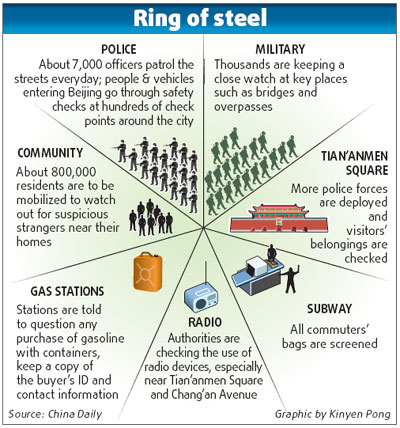Beijing beefs up anti-terror measures
Beijing has begun deploying thousands of additional police officers and checking vehicles entering the city to ensure a safe National Day celebration.
With little more than a month before the Oct 1 festivities marking the nation's 60th birthday, the city on Saturday raised its security level, putting at least 6,000 officers on its streets every day, Wang Jun, a senior officer with the patrol and special police team was quoted by local media as saying yesterday.
 |
Xu Ke, a driver who constantly travels between Handan in Hebei province and Beijing, said yesterday the toll station at the Beijing end of the Hebei-Beijing expressway has been fitted with new security-scanning machines.
Thousands of militia soldiers have also been deployed to watch key infrastructure such as bridges, overpasses, railways and highway tunnels, according to the police bureau.
Security measures have also been tightened in the city's subway system and key areas such as Tian'anmen Square.
All bags carried by subway passengers are subject to security checks, and armed police officers and plainclothes officers will patrol more often in Tian'anmen Square.
Bags taken into the square are being checked, China Daily noted over the weekend.
Taxi drivers have also been told to report any suspicious customers to police, especially along Chang'an Avenue, a major thoroughfare that runs along Tian'anmen Square, the latest issue of Southern Weekly reported.
The report also said the Beijing Radio Administration Bureau is screening radio devices in the city, especially near Tian'anmen Square, Chang'an Avenue and three "parade villages" where civilians and troops participating in the parade are exercising.
Meanwhile, gas stations have been asked to be wary of customers buying gasoline with containers. Stations are required to question the purpose of the purchase, and keep a copy of the buyer's ID card and contact information.
The administration also asks gas stations make contingency plans in case of emergencies, including terrorist attacks, administration director Zhang Jiaming was quoted by the local media as saying.
In June, a 62-year-old man ignited a bucket of gas he bought at a local station on a bus in Chengdu, killing 27 people, including himself.
Local communities have also been mobilized as an important supplement to police. The city's police bureau said ideally about 800,000 people would be involved, including college students, retired and self-employed residents. They will wear red armbands and watch for suspicious strangers around their communities.
Wang Taiyuan, a professor with the Chinese People's Public Security University, said these measures are a comprehensive system to improve security ahead of National Day.
He said unlike last year's Olympic Games, threats for National Day are more likely to come from inside the country than from abroad.
"However, the security work for the coming event is by no means easier. Some of the threats, such as Tibetan and Xinjiang Uygur separatists, may not give up the opportunity (to disrupt the celebration)," Wang said.
Li Wei, director of the center for counter-terrorism studies with the China Institutes of Contemporary International Relations, also said the risk of violence and terrorism rose after the July 5 riot in Urumqi in Xinjiang.
(China Daily August 24, 2009)
 0
0 







Comments